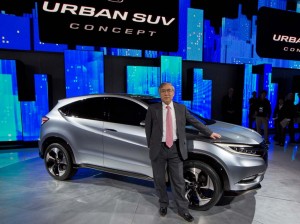
Hyundai is hot on hydrogen, cold on diesel. An early fuel cell mock-up is shown here at the maker's Korean R&D center.
While other manufacturers are considering wider use of diesel engines because of the fuel-economy they offer, Hyundai, says it plans to stick with gasoline engines in the vehicles it sells in North America.
John Krafcik, Hyundai Motor America chief executive officer, said a majority of consumers have a hard time getting around the costs of a diesel vehicle and the extra expense of diesel fuel.
“When you look at the extra cost of diesel (fuel), it wipes out the benefits of extra (mileage). Then when you add in the $3,000 cost for a diesel (engine), it just doesn’t make a lot of sense to a lot of consumers,” Krafcik told reporters during a briefing at the Hyundai Technical Center in Ann Arbor, Michigan.
Similar concerns were raised by Honda Motor Co. officials who this week cautioned TheDetroitBureau.com that, at least for now, they’re holding plans for a U.S. diesel on the backburner.
Emissions from diesel-powered vehicles represent one of the most serious obstacles to the broader use of diesel fuel in light duty vehicles. It takes a significant amount of added hardware to scrub out particulates and to reduce levels of smog-causing NOx. And there are concerns that future emissions rules will become all the more difficult – and expensive – for manufacturers to meet.
In addition, demand for diesel fuel in heavy-duty transport is expected to increase substantially in the future, creating even more upward pressure on the price of diesel fuel, Krafcik said.
“We have to pick the right key technology,” added John Juriga, Hyundai’s director of powertrains, who said the goal is to produce engine packages that deliver a combination of good value, fuel-efficiency and performance. “There is no single solution,” he said.
Hyundai is playing with a variety of alternatives, including hybrids as well as the hydrogen fuel-cell vehicle it is introducing at the L.A. Auto Show this week. It is also working up a battery-electric vehicle, much like sibling Korean carmaker Kia which will shortly launch its new Soul EV.
(For more on Hyundai’s plans for a hydrogen car, Click Here.)
Gasoline, however, remains the best fuel, Juriga argued, at least in part because NOx and particulate emissions are significantly lower than with diesel, eliminating the need for expensive after-treatment systems.
Given the regulatory hurdles facing diesels and the costs involved, Hyundai is following a strategy centered on making gasoline engines more efficient, officials said. “We want to make gasoline engines more like diesel engines,” according to Nayan Engineer, one of the leaders of engine development at the Hyundai Technical Center.
The maker’s engineering team is pushing for a 25% mileage increase in standard, gasoline-powered internal combustion engines by adopting such technologies as high-pressure direct injection, continuously variable valve trains, variable oil pumps that turn off when not needed, and low friction materials throughout the engine.
They are also exploring the possibilities for compression ignition technology similar to that used in a diesel engine. The hope is that this would produce better mileage than a traditional gasoline engine while burning cleaner than a diesel, according to the appropriately named Engineer, who said Hyundai is collaborating with mega-supplier Delphi on the development of such a new engine.
(US fuel consumption is falling sharply. Click Here for the full story.)
Hyundai won’t say when it would be prepared to bring the high-efficiency ICE to market but the tests have begun to move out of the lab and into the field.
Diesel has become the fuel of choice for roughly half of all European new car buyers, and German makers BMW, Volkswagen, Audi and Mercedes-Benz have been leading the charge to build demand – by offering more product – in the U.S.
A handful of American and Asian models are also rolling out, including the new Chevrolet Cruze diesel and the diesel version of the new Mazda6 due early next year. Nissan is looking to diesel to help boost demand for its slow-selling Titan pickup and Chrysler has a new Ram 1500 diesel for 2014.
(Click Here to find out about Honda’s strategy of shifting to downsized, turbocharged engines.)
But other key makers remain reluctant to follow suit. Toyota is largely focused on hybrid technology, as is Honda, though the latter maker is also exploring other options that include hydrogen, as well as advanced turbocharging. During a tour of the maker’s operations in Japan this week, senior officials including Tetsuo Iwamura, chief of global automotive operations, said Honda might eventually consider a U.S. diesel. But raising the same concerns as Hyundai Krafcik, Iwamura said that such a move is not in Honda’s immediate plans.
(Paul A. Eisenstein contributed to this report.)


Of course the extra expense of Diesel fuel negates the mpg benefits, but they still have lower maintenance and higher reliability. The only reason Diesel fuel is more expensive is because the oild industry Cabal is blackmailing the world. That problem could be fixed in 2 weeks time if people decided they’ve had enough of the blackmail.
I’ve driven diesel cars since 1983 (MB then VW this year) and they’ve really come a long way. Realize diesel is cheaper than gasoline nearly everywhere except the USA. I only lose about 30% of the mileage benefit due to price. And its interesting in Europe a diesel engine is only about €1500 [$1995] extra.